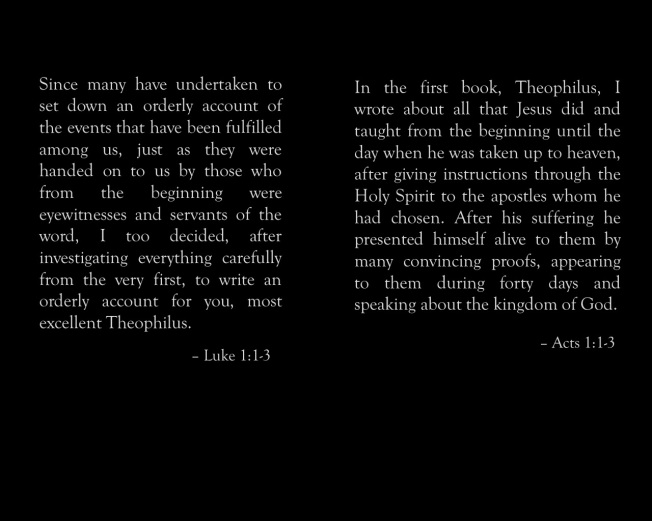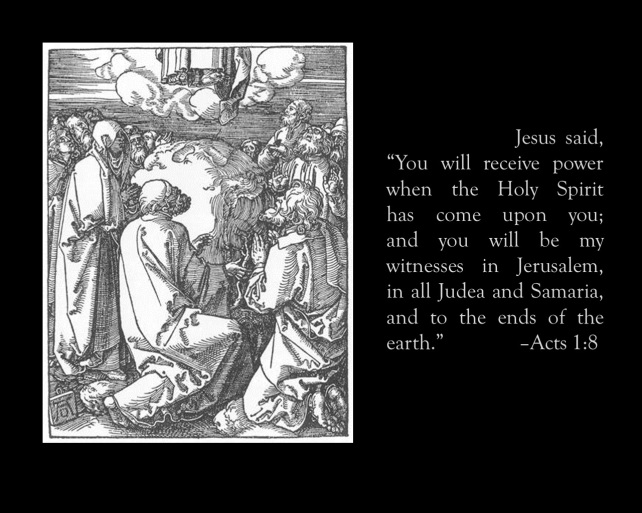5th Sunday of Easter (3May15) Acts8:26-40; 1John4:7-21 John15:1-8
The story of Philip and the Ethiopian official is lively and helpful, but with it, it may be helpful to do a little travelogue, a trip through the book of Acts with a view of the countryside and surroundings.
Acts is part 2 of the Gospel of Luke. They’re written by the same author and have similar themes and all. The Gospel of Luke tells the story of Jesus. Acts is the next part of the story. Although we call it the Acts of the Apostles and tend to focus on the human characters, the real story and main character in Acts is the Holy Spirit.
As the story picks up in the 1st chapter, Jesus is just about to exit the picture. (I love images of the Ascension, which show him exiting and only his feet sticking down.) Jesus is handing off the reins, saying that his followers will share the good news. They’ve been hiding out in Jerusalem since Good Friday and Easter, afraid to take a next step or say peep, but Jesus says that they will be his witnesses in Jerusalem and on to the surrounding regions called Judea and Samaria, and then to the ends of the earth. 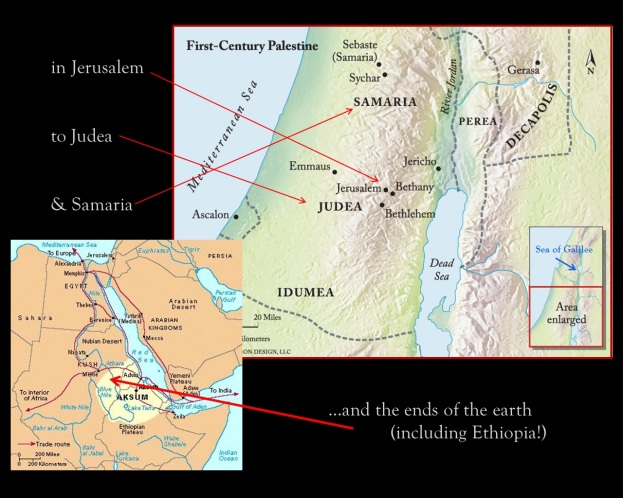 We’ll be coming back more to the “ends of the earth” later on.
We’ll be coming back more to the “ends of the earth” later on.
For now, it’s interesting to note that Jesus has sent them, has commissioned them, has committed them to spread the news far and wide, so they whole-heartedly decide to hunker back down.
Instead of getting to work, they hold a committee meeting, with the sole purpose of selecting a new member of the committee.
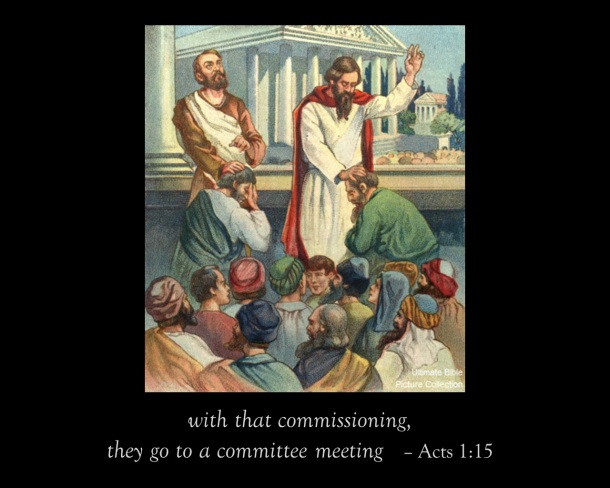 God forbid they’d share the work among the whole crowd of 120 men and women who were there together. No! They just want to fill one single spot vacated by Judas (who, it says in the story, had used the money he got for betraying Jesus to buy a field and tripped in the field and his guts burst out. Another version says he hanged himself. Thus this weird picture).
God forbid they’d share the work among the whole crowd of 120 men and women who were there together. No! They just want to fill one single spot vacated by Judas (who, it says in the story, had used the money he got for betraying Jesus to buy a field and tripped in the field and his guts burst out. Another version says he hanged himself. Thus this weird picture).
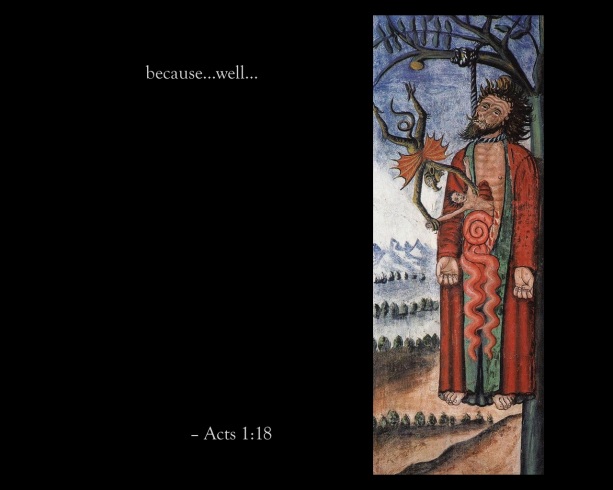 At any rate, Judas isn’t amid the crowd of witnesses eager to talk about Jesus, so they want to fill his place and get their core group back to 12 members.
At any rate, Judas isn’t amid the crowd of witnesses eager to talk about Jesus, so they want to fill his place and get their core group back to 12 members.
They have a nice hiring process, with a list of qualifications, a narrowed field of eligible applicants, a good prayer.
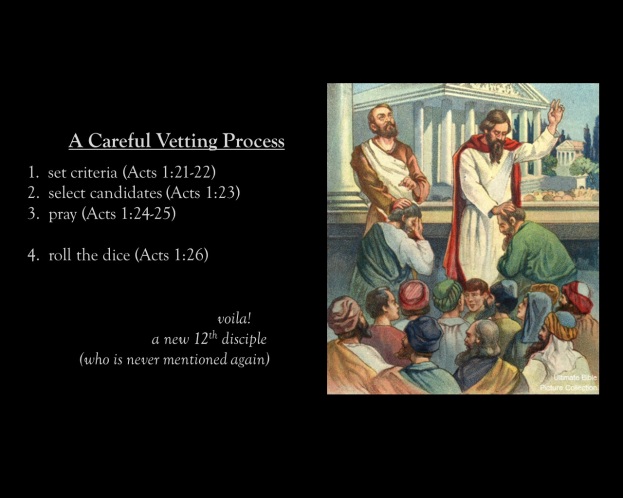 Then, to top it off and make certain they’re doing it right, they cast lots, drawing a name out of the hat.
Then, to top it off and make certain they’re doing it right, they cast lots, drawing a name out of the hat.
With all of that careful discernment and pious consideration for getting that 12th disciple into his role, the guy goes on never to be mentioned ever again. Because we turn the page.
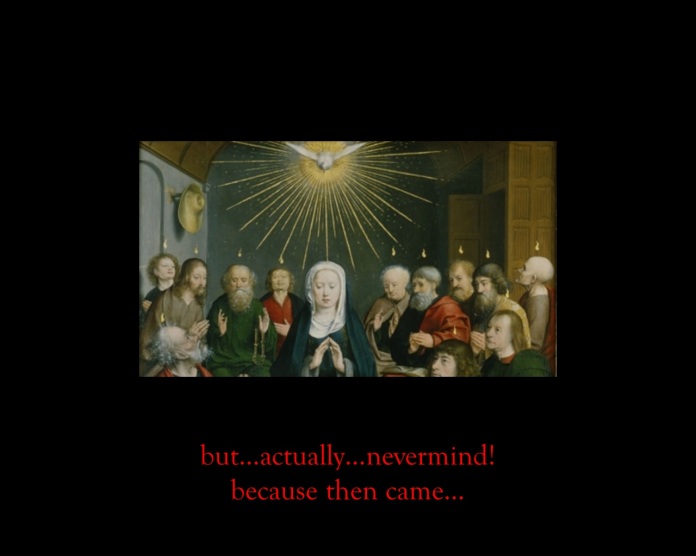 Chapter 1 ends, and chapter 2 of Acts tears off immediately in a new direction, letting us know it wasn’t about keeping an original team of 12.
Chapter 1 ends, and chapter 2 of Acts tears off immediately in a new direction, letting us know it wasn’t about keeping an original team of 12.
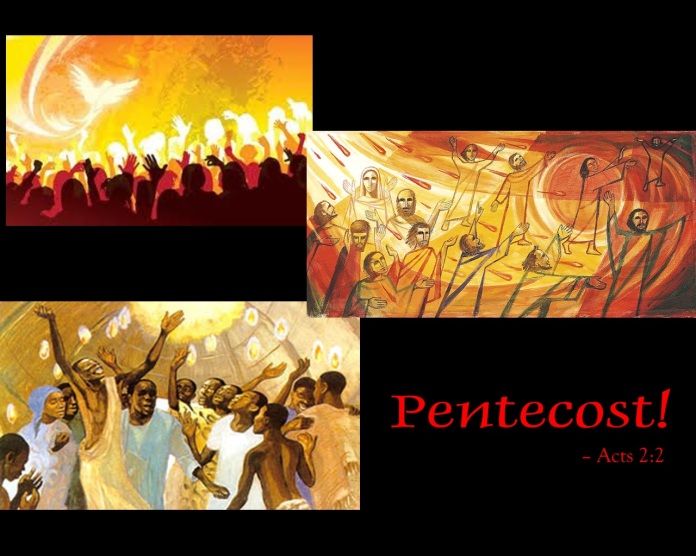 Instead, on Pentecost, here comes the Holy Spirit, to blow open those shut doors, and to open those shut mouths, and suddenly instead of 12, the ranks are filled with 3000 witnesses added in one day. That continues to expand exponentially, by leaps and bounds in the coming weeks.
Instead, on Pentecost, here comes the Holy Spirit, to blow open those shut doors, and to open those shut mouths, and suddenly instead of 12, the ranks are filled with 3000 witnesses added in one day. That continues to expand exponentially, by leaps and bounds in the coming weeks.
But growth also has uncomfortable downsides.
 The crowds create new problems. See, in this early church as we heard a couple weeks ago, sharing was super important. That was a prime mark of what it meant to be a Christian, to give and receive as any had need. But that’s more difficult with big groups, as we’re also aware in society’s work of caring for those in need. It’s not so simple as sharing the bag of potato chips or tearing your sandwich in half.
The crowds create new problems. See, in this early church as we heard a couple weeks ago, sharing was super important. That was a prime mark of what it meant to be a Christian, to give and receive as any had need. But that’s more difficult with big groups, as we’re also aware in society’s work of caring for those in need. It’s not so simple as sharing the bag of potato chips or tearing your sandwich in half.
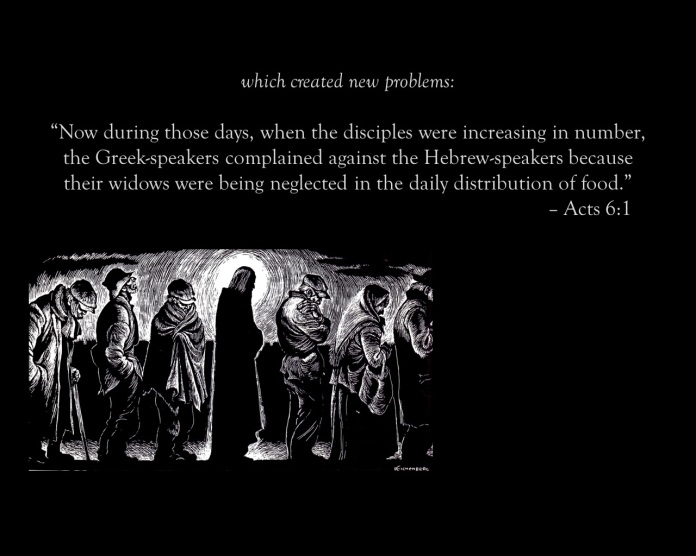 In this case, some people missed out. The only criterion was supposed to be having need, but we also tag on other emotion-filled qualifiers, labeling some as lazy, not meeting the requirements, as cheating the system, abusing the safety net, squandering their resources on other things, as drug addicts, as being too different, not speaking the same language.
In this case, some people missed out. The only criterion was supposed to be having need, but we also tag on other emotion-filled qualifiers, labeling some as lazy, not meeting the requirements, as cheating the system, abusing the safety net, squandering their resources on other things, as drug addicts, as being too different, not speaking the same language.
You’ll notice just as our society still holds obstructive prejudices, so also then, some of the widows weren’t getting their food. 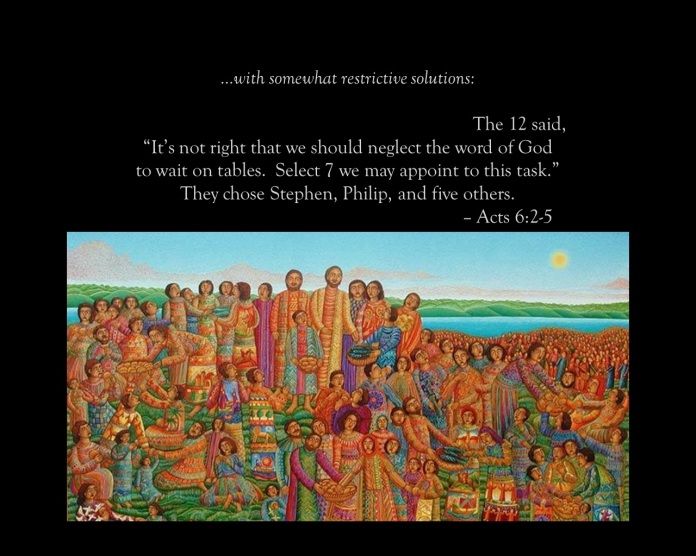 The central 12 disciples again enter the picture. Like any good leaders are apt to do when a problem is identified, they listen, carefully weigh possible solutions, and then pass the buck. They say, “don’t trouble us with this. We’ve got more important things to do. Take it up with somebody else.”
The central 12 disciples again enter the picture. Like any good leaders are apt to do when a problem is identified, they listen, carefully weigh possible solutions, and then pass the buck. They say, “don’t trouble us with this. We’ve got more important things to do. Take it up with somebody else.”
So the church chooses deacons, 7 faithful people to serve food, to run the pantry, to make sure everybody was getting what they needed. St. Stephen was the first and foremost in this faithful group. Philip, too. (A side note: it’s wonderful that we continue to embody Stephen’s example of sharing for the hungry. Thank you for your Mountain of Food support!)
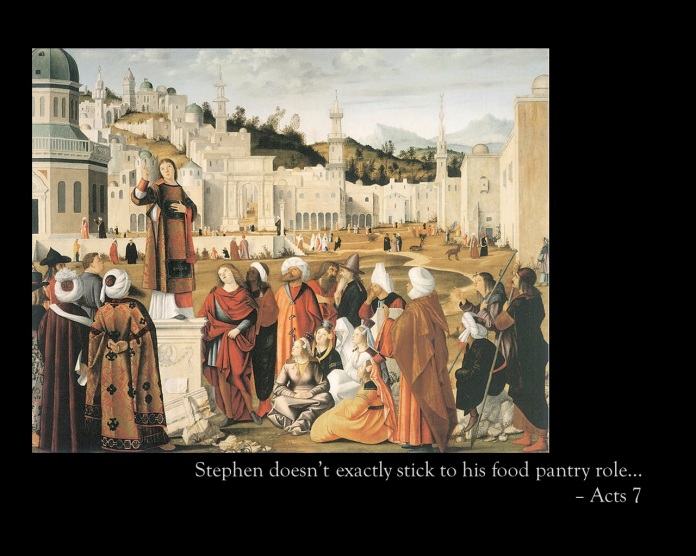 In the story, though, just as things again seemed to be settled and the central committee’s solutions were being implemented and all was proceeding according to plan, of course again at that point the Holy Spirit shows up for a change to new direction.
In the story, though, just as things again seemed to be settled and the central committee’s solutions were being implemented and all was proceeding according to plan, of course again at that point the Holy Spirit shows up for a change to new direction.
So the 12 apostles had said, “we’ll take care of the preaching, thank you very much.” The very next thing is that Stephen the waiter, Stephen the food guy, Stephen chosen strictly and solely to hand off things to the hungry, all of a sudden, in defending his faith, gives the longest sermon in the whole book of Acts. So much for the 12 being the only preachers.
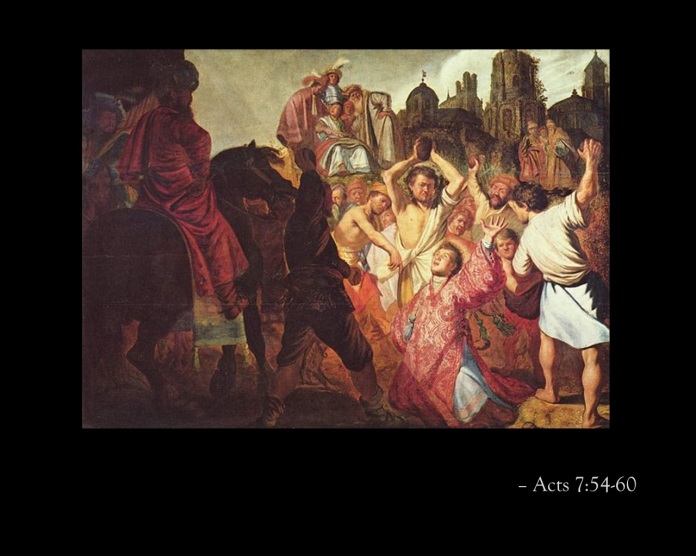 We might say Stephen preached a terribly effective sermon that touched an emotional nerve, because they kill him for it. They stone him to death. He is a martyr, the first, bearing witness to his faith and trusting life in the Lord Jesus even into death.
We might say Stephen preached a terribly effective sermon that touched an emotional nerve, because they kill him for it. They stone him to death. He is a martyr, the first, bearing witness to his faith and trusting life in the Lord Jesus even into death.
He wasn’t the only one. It says that after his death persecutions spread, so the Christians fled out from Jerusalem. Well, that also meant they were taking the message with them. Even through adversity, the Holy Spirit was still working. So Philip, another non-preacher food guy, winds up taking care of Jesus’ words from chapter 1, about being witnesses in Jerusalem, in Judea and Samaria, and to the ends of the earth.
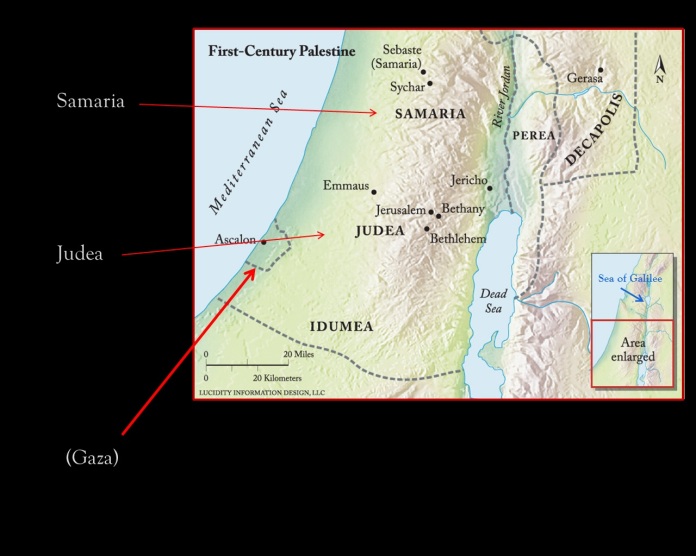 See, it says Philip goes to Samaria. Then he’s out on a road to Gaza, which is amid Judea.
See, it says Philip goes to Samaria. Then he’s out on a road to Gaza, which is amid Judea.
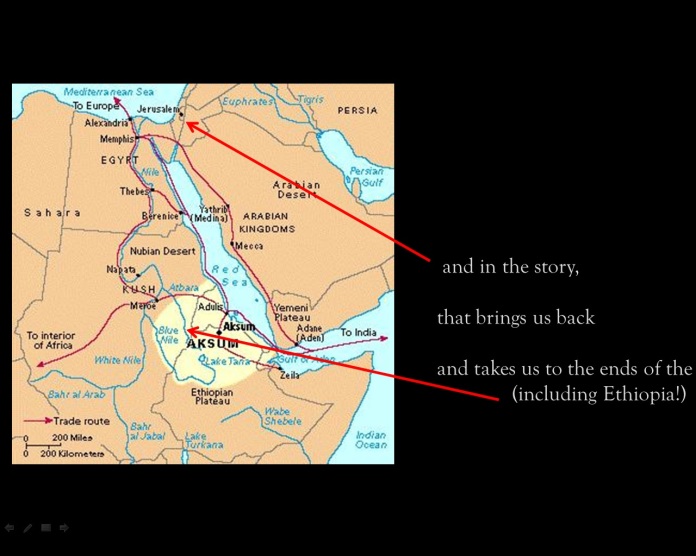 And finally is today’s reading about an Ethiopian official traveling home. He’s headed all the way back to the ends of the earth, the farthest country away from Jerusalem. And he’s going to take this news of Jesus with him.
And finally is today’s reading about an Ethiopian official traveling home. He’s headed all the way back to the ends of the earth, the farthest country away from Jerusalem. And he’s going to take this news of Jesus with him.
Besides living far away, one other detail about this Ethiopian is essential, with a really amazing, beautiful outcome. It says he was a eunuch, meaning castrated or unable to have sex. It’s odd that it says he was worshipping in Jerusalem, because Jewish law explicitly forbid somebody with his condition from being in the temple.
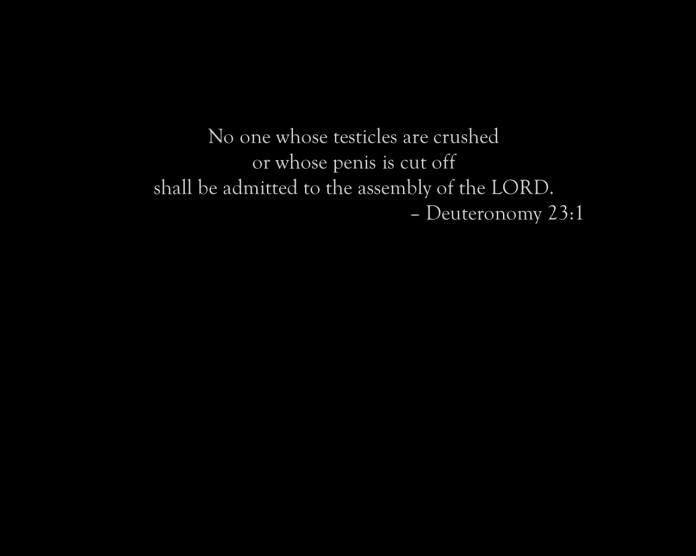 He was legally an outcast. When he asks, “What’s to prevent me from being part of the body of Christ?” the obvious answer, the correct answer should have been, “What prevents you is that your own body is broken and wrong.”
He was legally an outcast. When he asks, “What’s to prevent me from being part of the body of Christ?” the obvious answer, the correct answer should have been, “What prevents you is that your own body is broken and wrong.”
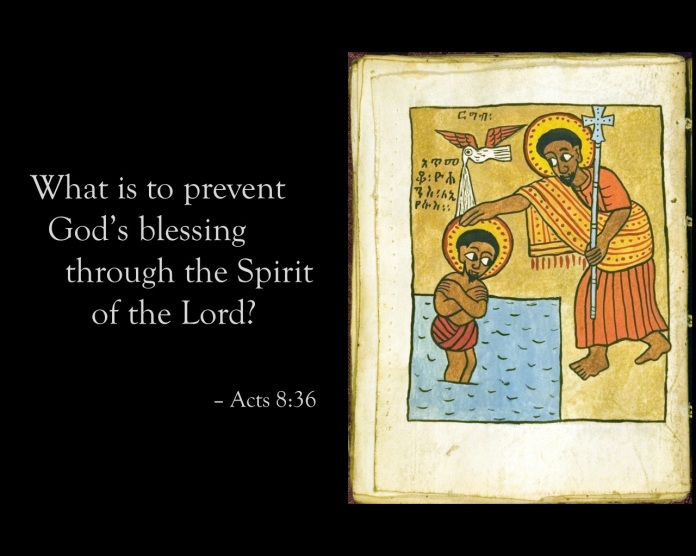 And yet Philip goes ahead and preaches to him and then baptizes him, incorporating him into the good news of the resurrection and of the body of Christ.
And yet Philip goes ahead and preaches to him and then baptizes him, incorporating him into the good news of the resurrection and of the body of Christ.
Well, the story of Acts doesn’t stop there. The Holy Spirit has some more surprises up her sleeves, but it’s time for us to ask, “so what?”
Maybe we first can see ourselves in this story with the Ethiopian. We’re far from Jerusalem. We have no birthright to be blessed by God. We by all rights should be excluded from worship—we’re sinners and outcasts and all with our own kinds of brokenness and imperfections, either born that way or inflicted on us. Yet the good news of life in Jesus is for you, too. It will come and find you on your wilderness roads, amid confusions and any place the Holy Spirit has to seek you out. She finds you like six-month-old Evelyn Rose in her baptism this morning, who has done nothing to earn or understand this blessing. But what’s to prevent it? With the abundant life of Jesus and the ever-expanding mission of the Holy Spirit, nothing can prevent it. The good news is, indeed, for you.
And for all. That maybe makes us see ourselves with Philip, as unlikely witnesses to this abounding grace. God’s word still shows up on your lips, even if you don’t claim to be officially chosen for that sort of thing. It comes from baptismal sponsors and parents and grandparents and Mari Mitchell’s English essay this week including a reference to unconditional love and 1st Corinthians 13. It’s in cards the Swenson sisters send, and in all your own ways. It’s the “hymn of all creation,” as we sang in the canticle of praise and about our voices together in the opening hymn. Indeed, the reason we sing hymns is to put the sermon in your mouth. So this work of the Holy Spirit and proclamation of love is on the loose!
Which also corrects and blows open today’s other slightly-too-restrictive Bible readings. In the community of 1st John, the focus seems to have been about looking out for others at church. But the Holy Spirit—who won’t let 12 disciples stay behind locked doors but presses thousands and now billions of us onward and outward to the ends of the earth—must surely be about broader love than just what happens in small church gatherings. This is a bigger family, without bounds or barriers. It’s God’s crazy care on the loose.
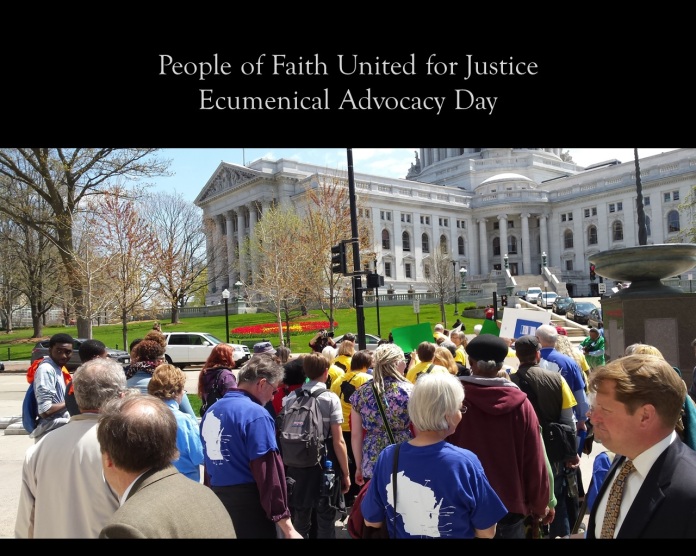 So the Holy Spirit compelled us to speak at advocacy day this week, with the voice of hundreds of Christians and other faiths from our state calling for prison reform and supporting the social safety net and looking out for immigrants, speaking up on behalf of others, those in need in our family.
So the Holy Spirit compelled us to speak at advocacy day this week, with the voice of hundreds of Christians and other faiths from our state calling for prison reform and supporting the social safety net and looking out for immigrants, speaking up on behalf of others, those in need in our family.
 We also recognize the expanded care of this family all the way on the other side of the world in the candlelight vigil Confirmation class participated in because of the earthquake in Nepal and in your support and offerings today to help with Lutheran Disaster Response.
We also recognize the expanded care of this family all the way on the other side of the world in the candlelight vigil Confirmation class participated in because of the earthquake in Nepal and in your support and offerings today to help with Lutheran Disaster Response.
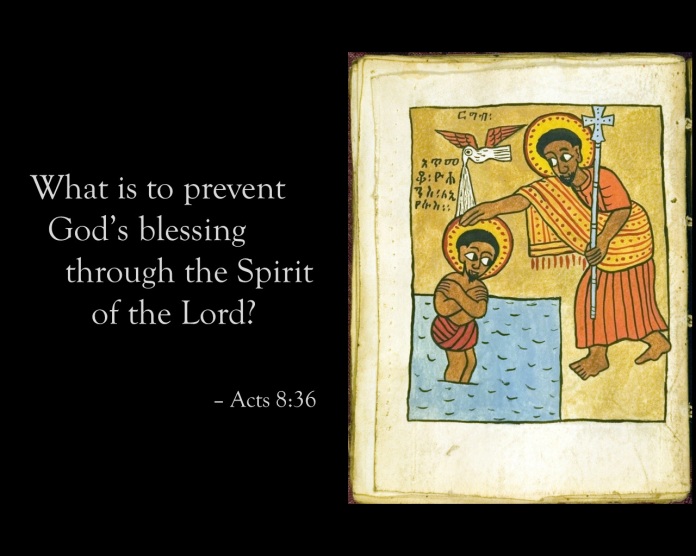 Maybe a notch harder, the Holy Spirit is also ahead of us in Baltimore. She is pressing us beyond our tired old divisions of race and class, obstructions of prejudice and of injustice to see things from a new perspective, to see our whole hurting world as held in the embrace of a rejected God who has holes pierced in his hands and shame on his brow. There’s nothing that will stop the work of this God who keeps chasing after you and spreading the life of Jesus everywhere.
Maybe a notch harder, the Holy Spirit is also ahead of us in Baltimore. She is pressing us beyond our tired old divisions of race and class, obstructions of prejudice and of injustice to see things from a new perspective, to see our whole hurting world as held in the embrace of a rejected God who has holes pierced in his hands and shame on his brow. There’s nothing that will stop the work of this God who keeps chasing after you and spreading the life of Jesus everywhere.
We see this enormous family not only with sisters and brothers who look like us or live near us, not only those endeared to us or beneficial for us, not even only as humans but the whole family of creation, caring for all life. When we pollute and plunder against planetary wellbeing, nevertheless the Holy Spirit breaks in and asks, “What’s to prevent the blessing of waters and the sustenance of life? What’s to prevent the resurrection being made alive in you and shared with all the world? What’s to prevent it? What could possibly stop God’s work and Jesus’ life and this wild Holy Spirit? What could prevent it?” Nothing!
After all, she’s already out preparing the way ahead of you and Alleluia! Christ is risen!
Hymn: Like the Murmur of the Dove’s Song (ELW #403)

